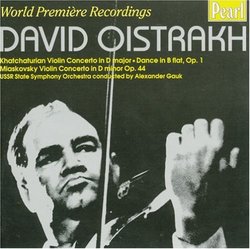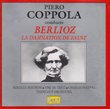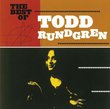| All Artists: Aram Khachaturian, Nikolay Myaskovsky, Alexander Gauk, USSR State Symphony Orchestra, Abram Makarov, David Oistrakh Title: Aram Khachaturian: Violin Concerto in D major; Dance in B flat, Op. 1; Nikolai Miaskovsky: Violin Concerto in D minor Members Wishing: 0 Total Copies: 0 Label: Pearl Release Date: 11/18/1997 Genre: Classical Styles: Forms & Genres, Concertos, Instruments, Strings Number of Discs: 1 SwapaCD Credits: 1 UPC: 727031929529 |
Search - Aram Khachaturian, Nikolay Myaskovsky, Alexander Gauk :: Aram Khachaturian: Violin Concerto in D major; Dance in B flat, Op. 1; Nikolai Miaskovsky: Violin Concerto in D minor
CD DetailsSimilar CDs |
CD ReviewsSparkling Performance By Oistrakh mrdjkoch | Silver Spring, MD USA | 04/04/2002 (4 out of 5 stars) "Dmitri Shostakovich once called Alexander Gauk "a rare specimen in stupidity." However, this recording proves the great composer wrong; Gauk conducts the orchestra beautifully in these two pieces. And Oistrakh is Oistrakh, no complaints about him.I was pleasantly surprised when I found this recording. Both concerti are unjustly ignored by today's audiences. I will tell about them one at a time.The Khachaturian concerto has often been accused of being bombastic and loud; and it is true that the orchestral tuttis are a bit lacking in substance, but that doesn't keep this from being a thouroughly enjoyable piece. It is imbued with the spirit of Armenian folk dance (as is all of Khachaturian's music). And the solo violin writing is superb. This concerto was dedicated to Oistrakh and won the Stalin Prize in 1940. In fact, this is the premier recording. The sound is a bit fuzzy, and there is an annoying sweeping noise during the first movement cadenza. In this respect a more recent recording, such as the one by Perlman; still, collectors will take interest in having a premier recording.Miaskovsky's Violin Concerto is a warmly romantic piece that truly deserves to be in the standard concerto repetoire. After hearing it, you'll wonder why Miaskovsky is so obscure. The reason is Stalin. Stalin took a dislike to Miaskovky's more experimental music (such as his Scriabin-esque piano sonatas) and banned it. People were forced to forget him, which was not easy since he had been such a popular composer ("the air was full of his music," Shostakovich said).So, down to the concerto itself. It is a beautifully written piece, very virtuosic indeed. Pervading all three movements is a sense of romantic longing and nostalgia. It is masterfully crafted and the orchestration is well done. The slow movement is very lyrical (compare to Dvorak's concerto) and the finale will leave you particularly satisfied. Watch out, though! The final chord comes very suddenly. The sound on this recording isn't great, but I believe I am correct in saying that this is the only CD recording of this work. There is no competition.Along with the two concerti, Khachaturian's virtuosic Dance in B flat makes for interesting filler. There's also an interesting fact about these recordings: they are recordings of performances that were also filmed. If you've ever seen the PBS documentary on Great Violinists, remember the part were they show Oistrakh playing Khachaturian's Concerto? Same performance.Aren't old recordings great?" Excruciatingly Beautiful cal lewin | Lahaina, HI USA | 04/28/2004 (5 out of 5 stars) "I have a special affection for the excruciatingly beautiful Khachaturian Violin Concerto, and this is my choice for the best recording. Here is the spectacle of brilliant young David Oistrakh in 1940 during the depths of World War II, standing on stage in Moscow with a single violin engaging in mortal battle with the USSR State Orchestra -- a sublimely beautiful battle that cries out the overwhelming change and struggles of the 20th century. Oistrakh caught up in the maelstrom of history, and emerging. On the surface the score has an ethnic "oriental" Armenian romanticism, timeless, beautiful and moving, yet at it's core it is modern, gritty, frantic, gigantic, and this conflict reinforces the feeling of the collision between the past and future ages. Or of the lone individual caught in the forces of history, fate and society enlarged beyond human scale. As for the performance, Oistrakh is able to bend the tones, dig for the raw textures and build the tension to wring intense passion that literally flies off the recording. In the Allegro, at times the strange harmonies and rhythms flood forth so rapidly they are almost too fast to hear. The force of Oistrakh's playing makes me wonder if he will break his violin. In the dark Andante his soul overflows with sadness and regret. The word virtuoso barely begins to describe the dexterity and soul of this amazing performance. What art! The orchestra under conductor Alexander Gauk captures a certain older native tonal quality of Russian music that seems to belong to some eastern tone system, slightly different than our ears are used to. Khachaturian asked Oistrakh to premier the piece, and I believe this is the first recording of it. It is interesting to compare this version with Oistrakh's 1960s recording with the composer conducting, also very beautiful, but in the extreme moments a more careful performance, and so less passionate." Best playing possible; not best sound however Larry VanDeSande | Mason, Michigan United States | 09/30/2005 (4 out of 5 stars) "Both Khachaturian and Miaskovsky wrote their concertos for David Oistrakh, who comprised a trio of 20th century superstars from Russia with pianist Sviatoslav Richter and cellist Mstislav Rostropovich.
Oistrakh's playing in these performances is wonderful, first rate in execution and sensitivity with flexible phrasing and near perfect emotional pitch. He does exemplary work in the jaunty Violin Concerto in D minor from Khachaturian, with its dramatic ostinato theme from the first movement and cleverly paced finale. The USSR Symphony Orchestra and Alexander Gauk ably accompany the soloist here and in the meatier Concerto in D minor by Miaskovsky, with its lengthy cadenzas and solo parts amidst a concerto that more rivals Tchaikovsky's than Khachaturian's. Many young buyers will be put off to no end by the ancient sonics of this release, however, with these performances dating back to mid-20th century and having been recorded in mono. For me the sound was fine but, if you are an audiophile and value sound over music performance, you probably won't be very happy with this recording." |


 Track Listings (7) - Disc #1
Track Listings (7) - Disc #1


